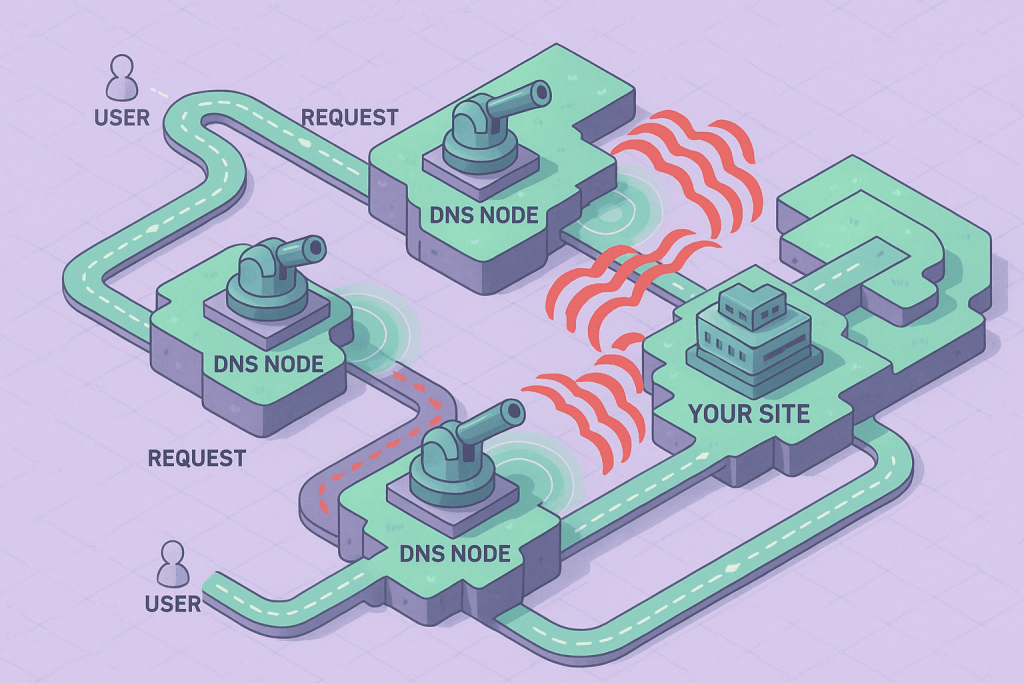
In today’s internet environment, every millisecond counts. Website speed and stability directly affect user experience, search engine rankings, customer trust, and a company’s reputation. One of the key components that influence website performance is DNS infrastructure. In this article, we’ll explore how virtual DNS locations based on Anycast DNS can improve performance, ensure high availability, and enhance the security of your online resources.
What Is Anycast DNS?
Anycast DNS is a network routing technique where the same IP address is assigned to multiple physical DNS servers located in different geographic locations. When a user sends a request to that IP address, it is automatically routed to the server that is geographically or topologically closest to the user.
In other words, Anycast allows the same domain name to respond from different locations around the world, depending on where the request originates. This approach is fundamentally different from traditional Unicast DNS, where each IP address is bound to a single server.
How It Works
When a user enters a domain name into a browser, the domain name system (DNS) resolves it into an IP address. The closer the DNS server is to the user, the faster this resolution occurs. Anycast DNS ensures:
- Minimal latency by routing the request to the nearest available node;
- High availability — if one server fails, another takes over seamlessly;
- DDoS mitigation — distributing the attack load across multiple servers weakens its effectiveness.
Benefits of Anycast DNS for Websites and Businesses
1. Faster Website Loading
Thanks to DNS nodes being geographically close to users, domain resolution times are reduced. As a result, websites load faster — especially important for international audiences. This is critical for e-commerce, media platforms, and SaaS providers.
2. High Fault Tolerance
If one DNS server goes offline, requests are automatically rerouted to the next available server. This guarantees stable website operation without noticeable downtime.
3. Global Availability
Your site will be equally accessible and responsive whether users are in Ukraine, Europe, the USA, or Asia. Anycast DNS acts like a CDN for DNS, allowing global performance without deploying infrastructure in every region.
4. Improved SEO
Search engines take DNS response times into account. Lower latency improves technical SEO metrics like Time to First Byte (TTFB), contributing to higher rankings in search results.
5. Protection Against Attacks
Anycast infrastructure is more resilient against DNS-based DDoS attacks, as malicious traffic is dispersed across multiple nodes. This is especially relevant for companies in finance, online retail, and critical online services.
Where Anycast DNS Is Most Useful
- For online stores that serve international customers;
- For SaaS platforms where response time is mission-critical;
- For global brands with traffic from multiple countries;
- For VPS-hosted projects with distributed user bases;
- For domain owners who want enhanced reliability and security.
How to Set Up Anycast DNS for Your Domain
- Choose a DNS provider with Anycast support. Many modern domain registrars, including RX‑NAME, offer this functionality.
- Configure your DNS records (A, AAAA, CNAME, MX, TXT, etc.) through the registrar’s control panel.
- Test performance using global monitoring tools such as DNSPerf or Pingdom to verify that responses are served from the closest DNS node.
- Optionally: enable DNSSEC to ensure integrity and protect against DNS spoofing.
When Anycast Is Especially Valuable
- When your server is located in Europe, but your clients are spread across North America or Asia;
- If you run a high-traffic website where every second matters;
- If your site must maintain 24/7 uptime without interruptions;
- If you’re managing multiple VPS projects and need centralized, fail-safe DNS infrastructure.
How RX‑NAME Helps You Build Fast and Secure DNS Infrastructure
At rx-name, you can register domain names in dozens of TLDs with powerful DNS management tools, automatic renewals, flexible configurations, and enhanced security features. If you’re already using a VPS or planning to rent a server, enabling Anycast DNS is a smart move to boost your project’s performance and reliability.
Conclusion
Anycast DNS is a modern technology that significantly reduces latency, improves uptime, and enhances the security of your online services. In a digital world where speed and stability are key competitive advantages, implementing virtual DNS locations is not just optimization — it’s a strategic decision.By choosing RX‑NAME for domain registration or VPS hosting, you gain access to not only professional services but also a scalable platform ready for automation, global traffic, and long-term growth.

Leave a Reply